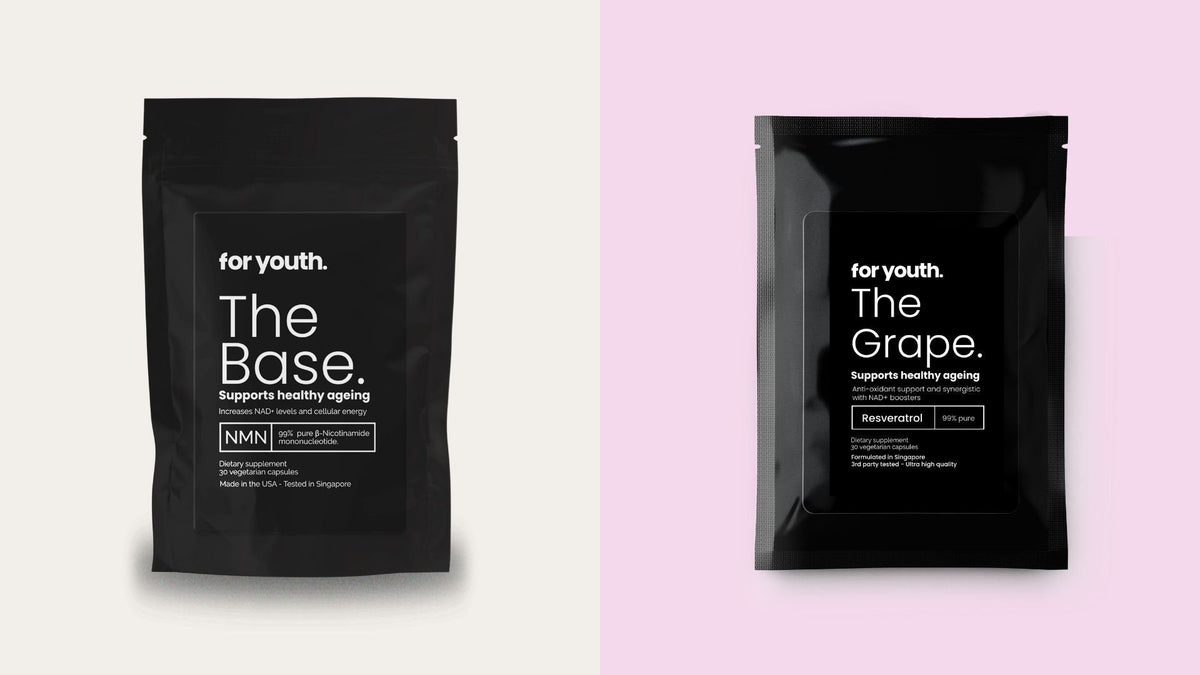
NMN vs. Resveratrol – the difference explained.
|
|
Time to read 3 min

|
|
Time to read 3 min
NMN and Resveratrol are two of the most talked-about ingredients in longevity science — and for good reason. While they’re often bundled together in conversation (and sometimes in products), these two molecules serve very different — but highly complementary — roles in your body’s fight against ageing.
If you’ve ever asked “Should I take NMN or Resveratrol?” — this is the article for you.
NMN (Nicotinamide Mononucleotide): Found in foods like cabbage, cucumber, soybeans, and broccoli. It boosts NAD+ , the coenzyme behind energy, DNA repair, and cellular resilience.
Resveratrol (3,5,4′-trihydroxy-trans-stilbene): A polyphenol found in grape skins, peanuts, and berries. It protects against damage and activates genes related to ageing and stress response.
Both have strong longevity credentials. But while NMN builds up your cellular fuel, Resveratrol helps flip the genetic switches that tell your cells to start repairing.
Ageing is driven by cellular damage: oxidative stress, inflammation, epigenetic drift, mitochondrial decline. In 2013, scientists summarised this in a now-famous model: the 9 Hallmarks of Ageing .
NMN and Resveratrol work synergistically to support all nine:
NMN provides the fuel (NAD+)
Resveratrol flips the switch (activates longevity genes like sirtuins)
Together, NMN and Resveratrol address these root causes:
NAD+ (Nicotinamide Adenine Dinucleotide) is essential to life — but it declines with age, dropping by up to 50% by your 40s. Low NAD+ is associated with fatigue, cognitive decline, and increased disease risk.
Supplementing with NMN helps restore NAD+ levels, which may:
Convert food into energy
Repair DNA
Activate sirtuins (cellular repair proteins)
Combat ageing at the root
Your NAD+ levels decline with age. NMN restores them — powering back your cellular metabolism, brain clarity, and vitality .
Resveratrol activates sirtuins — the genes that flip on cellular repair mechanisms. It mimics the effect of caloric restriction , which is proven to extend lifespan across species.
Resveratrol has been studied for:
Cardiovascular support
Antioxidant protection
Blood pressure and cholesterol balance
Insulin sensitivity and metabolic health
Here’s the magic: sirtuins (activated by Resveratrol) need NAD+ (boosted by NMN) to function.
So:
Resveratrol = the switch
NMN = the fuel
Take one and you support part of the system. Take both and you amplify the whole longevity pathway.
✅ More stable physical energy
✅ Sharper focus and brain clarity
✅ Deeper sleep and brighter skin
💓 Cardiovascular benefits
🧬 Healthier biological ageing
🕒 Slower cellular decline over time
If you're over 30 or feeling sluggish → Start with NMN
If you're focused on heart health or inflammation → Try Resveratrol
If you want to target all 9 Hallmarks of Ageing → Take both together
As always, consult your healthcare provider before beginning a new supplement.
The global healthy ageing supplement market is projected to hit USD 2.16B by 2034
North America leads with 40%+ of global sales
Asia Pacific is the fastest-growing region (7.5% CAGR)
Capsules dominate with a 60% market share
Interest in anti-ageing supplements is only growing — especially in clean, research-backed products like NMN and Resveratrol.
A 2024 double-blind trial showed NMN (and NR) improved walking distance in patients with artery disease
NMN + Resveratrol are part of a new generation of longevity compounds
David Sinclair’s lab is working on reversing epigenetic age using these molecules
More studies now focus on stacking NMN with resveratrol, quercetin, or spermidine
The Base – NMN : Made with 99% pure NMN, sourced and encapsulated in Europe
The Grape – Resveratrol : Clean, high-purity trans-resveratrol with third-party testing
Zero China origin | Pharmaceutical-grade | Honest sourcing
For Youth is redefining what longevity looks like — with clean, clinical-grade supplements and full transparency.
Whether you’re starting your longevity journey or levelling up your supplement stack — NMN and Resveratrol are a powerful foundation .
NMN boosts NAD+
Resveratrol activates sirtuins
Together they target all 9 Hallmarks of Ageing
If you want better energy, stronger cells, and a shot at a longer, healthier life — this duo is where you start.